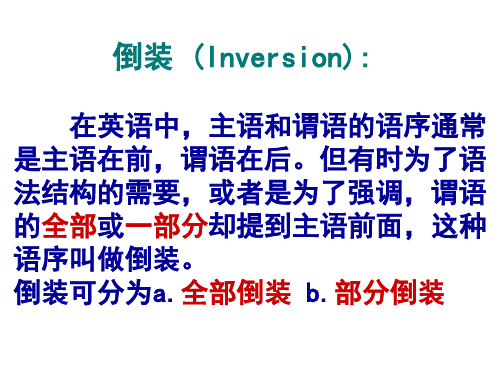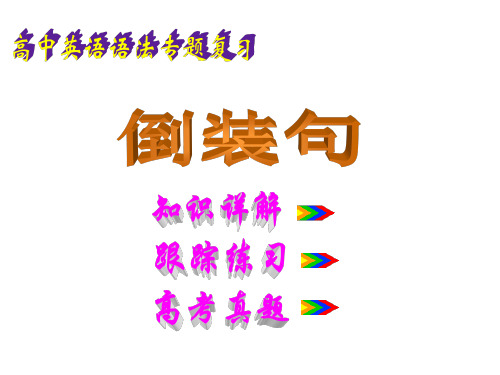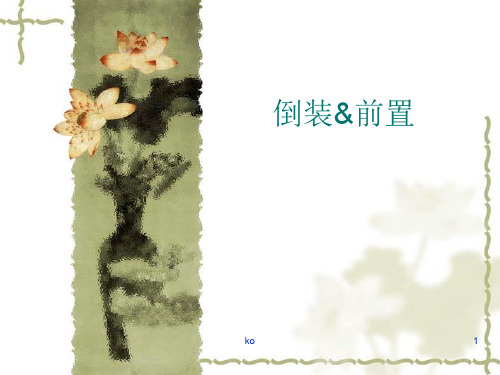高中高考英语语法倒装句复习课件.ppt
合集下载
高中英语语法 倒装句语法课件(共63张PPT)

B 3. (2005江苏) ________ about wild plants that they decided to
make a trip to Madagascar for further research.
A. So curions the couple was B. So curious were the couple
open.
A. Try as she might
B. As she might try
C. She might as try
D. Might she as try
33. __D____, the boy knows a lot about computer.
A. Though is he young B. As is he young
3) 介词短语+be+主语 Among the goods are Christmas trees, flowers and toys.
6. 为了保持句子平衡或为了强调表语或状语,为 了使上下文紧密衔接。
a. inside the pyramids are the burial rooms for the s and queens.
如果后一个句子只是单纯的重复前面句子的意 思,则不倒装。
“It is hot today.” “So it is.”
“He finished it on time.” “So he did.”
当前面的句子中主语、谓语或肯否定形式不同时, 则用so it is with….,或it is the same with …句型来表 示。
A are hanging B hanged C hang D hangs
【课件】2023届高考英语语法基础倒装句课件

3.形式倒装
(2)常见结构 ②as/though引导的让步状语从句
宾语
Boy as/though he was ,he was chosen as king..
3.形式倒装
as,though,although引导让步状语从句
① s引导让步状语从句时,必须倒装; ②though引导让步状语从句时,可例可不倒; ③although引导让步状语从句时,不用例装。
经典练习
On the ground_________,which were to be shipped to some other cities. y some air conditioners B.some air conditioners lay id some air conditioners were in some air conditioners were
We not only enjoyed the class,but also recommended it to our friends →Not only did we enjoy the class,but also recommended it to our friends.
2.部分倒装
(1)常见结构
“如此......以至于......”
such + (a/an)+adj.+n.+部分倒装+that。
So shallow is the lake that no fish can live in it. =Such a shallow lake is it that no fish can live in it.
1.完全倒装
(2)常用形式2 ① 地点介词短语开头(介+名) ② 谓语动词表某种状态(be,stand,sit,lie,hang等) ③ 主语是名词 Betweg. At the meeting place of the Yangtze River and the Jialing River lies Chongqing.
高考英语语法一轮复习——倒装(共22张PPT)

So beautiful did she look that every one of us were surprised.
Such great progress did he make that he was praised.
1. So nervous ____D____ that she made several
助动词/情态动词 /系动词 +主语 + 实意动词+其它
Away flew the birds. 完全倒装
Not until the teacher came did he finish his
homework.
部分倒装
完全倒装
1、当there 、here、now、then 、 in 、out 、 up 、 down 、 away, off, etc等副词位于句首时,谓语动词 是come, go, fly 等表示位置移动的动词, 常用全部
Between the two buildings stands a tall tree. Under the table lay a dog
In front of the gate stand two stone lions.
4. 当主语太长, 且句子结构是“主+系+表”时,
可以用完全倒装,即: 表+系+主
C. do I speak
D. I speak
2、表示否定意义的词位于句首时,如:not, never,
seldom, hardly, barely, scarcely, little, not until, by no means, in no time, not only…but,no sooner than, in no case, nowhere, neither, nor, rarely放在句首时 用部分倒装
Such great progress did he make that he was praised.
1. So nervous ____D____ that she made several
助动词/情态动词 /系动词 +主语 + 实意动词+其它
Away flew the birds. 完全倒装
Not until the teacher came did he finish his
homework.
部分倒装
完全倒装
1、当there 、here、now、then 、 in 、out 、 up 、 down 、 away, off, etc等副词位于句首时,谓语动词 是come, go, fly 等表示位置移动的动词, 常用全部
Between the two buildings stands a tall tree. Under the table lay a dog
In front of the gate stand two stone lions.
4. 当主语太长, 且句子结构是“主+系+表”时,
可以用完全倒装,即: 表+系+主
C. do I speak
D. I speak
2、表示否定意义的词位于句首时,如:not, never,
seldom, hardly, barely, scarcely, little, not until, by no means, in no time, not only…but,no sooner than, in no case, nowhere, neither, nor, rarely放在句首时 用部分倒装
高三英语一轮复习语法之完全倒装句课件

“I’ll call again after supper,” said he.(他说) “Let me go on with the operation.” said one of the doctors . (其中一 个医生说)
小结:完全倒装 ✓ Rule 1:(时间/空间)副词位于句首:here, there, now, then, up,
of,On the wall, To the east of,Around his head... ✓ e.g. Inside the garden grow a variety of flowers. ✓ Rule 3:表语是分词、副词、形容词、介词短语,且主语是名词时:
表语+系动词+主语 ✓ e.g. Standing beside the desk was a teacher. ✓ Rule 4:直接引语的一部分或全部放在句首时,有时用倒装。 ✓ e.g.“I’ll call again after supper,” said he.
In the south of Mount Heng sits a beautiful modern city — Hengyang.
⑤在她的前面是另一条长长的通道,她正好看到那只兔 子匆匆向远处跑去。
In front of her was another long passageway and she just managed to catch sight of the rabbit hurrying down it.
完全倒装句
一些同学对于倒装的认知……
教材原句(译林版B1U1 Reading):
Of equal importance are good study habits,
小结:完全倒装 ✓ Rule 1:(时间/空间)副词位于句首:here, there, now, then, up,
of,On the wall, To the east of,Around his head... ✓ e.g. Inside the garden grow a variety of flowers. ✓ Rule 3:表语是分词、副词、形容词、介词短语,且主语是名词时:
表语+系动词+主语 ✓ e.g. Standing beside the desk was a teacher. ✓ Rule 4:直接引语的一部分或全部放在句首时,有时用倒装。 ✓ e.g.“I’ll call again after supper,” said he.
In the south of Mount Heng sits a beautiful modern city — Hengyang.
⑤在她的前面是另一条长长的通道,她正好看到那只兔 子匆匆向远处跑去。
In front of her was another long passageway and she just managed to catch sight of the rabbit hurrying down it.
完全倒装句
一些同学对于倒装的认知……
教材原句(译林版B1U1 Reading):
Of equal importance are good study habits,
高中英语语法复习:倒装句课件(共48张PPT)

•only by wor harder can we solve the problem.
•I realized that I should have taken your advice only when I lost the game. •Only when I lost the game did I realize that I should have taken your advice.
to his wife. • Nor could his wife.
A strong negative feeling.
• 表示强调。 • 承上启下。 • 平衡结构。 • 增强句子的表现力。 • 制造悬念,渲染气氛。
基本语序
主语 + 谓语
He knew no one in Paris.
倒装语序
An old jacket hangs on the wall. Two lakes lie to the east of the city.
3. 以引导词there开头的句子,须使用倒 装结构,除 there be 外还有there live / stand
THhaorudgahshheewwoorrkkeeddh, ahredf,ahileedfa.iled.
Trhyouagshhehemmigihgth,tTtorym, Tcomuldconuoltdgneot tout goef thoeudtiofffictuhletyd.ifficulty.
Exercises: •I did not begin to do my homework until my mother came back.
Not until (my mother came back) did I begin to do my homework.
•I realized that I should have taken your advice only when I lost the game. •Only when I lost the game did I realize that I should have taken your advice.
to his wife. • Nor could his wife.
A strong negative feeling.
• 表示强调。 • 承上启下。 • 平衡结构。 • 增强句子的表现力。 • 制造悬念,渲染气氛。
基本语序
主语 + 谓语
He knew no one in Paris.
倒装语序
An old jacket hangs on the wall. Two lakes lie to the east of the city.
3. 以引导词there开头的句子,须使用倒 装结构,除 there be 外还有there live / stand
THhaorudgahshheewwoorrkkeeddh, ahredf,ahileedfa.iled.
Trhyouagshhehemmigihgth,tTtorym, Tcomuldconuoltdgneot tout goef thoeudtiofffictuhletyd.ifficulty.
Exercises: •I did not begin to do my homework until my mother came back.
Not until (my mother came back) did I begin to do my homework.
高中英语语法——倒装课件(33张ppt)

• 这个年轻科学家对他的研究如此专注以至 于每晚很迟才睡觉。(So)
• So devoted is the young scientist to his research that he goes to bed very late every night.
• 她是个热心人,乐于帮助任何有困难的人。 (Such)
• Not until their graduation from high school do a majority of students come to realize that they haven’t made the best use of time at school.
• 直到21世纪末中国运动员才开始以奥利匹 克运动会上的出色表现令世界可能不喜欢他,但必须承认他的伟大。 • Dislike him as we may, we must acknowledge his
greatness. • 尽管他想方设法,却未解决这个问题。 • Try as he might, he couldn’t solve the problem. • 钱虽然丢了,我们却得到了许多经验。 • Lose money as I did, we got a lot of experience. • 尽管落选了,但他却以其反对奴隶制的激烈演
• Only through reading widely can one master knowledge and become a talent that the society calls for.
SO
• 像他的薪水上涨一样,他对拥有一栋自己的房 子的渴望也愈加迫切。(so)
• As his salary rises, so does his desire for a house of his own.
高考英语 倒装结构复习课件

三、由here(或there)引导,谓语为be的句子,如: Here is China’s largest tropical forest. Here are some picture-books.
注:如果主语为人称代词,仍用自然语序,如: Here you are. / Here we are. / Here it is. / There he is.
八、当as引导让步状语从句时,可以把表语提到前面来,采用“形 容词(或副词、名词)+ as +主语+谓语”这种形式,如: Old as my father is, he keeps up with his English study. Child as he is, he knows something of electricity. Tired as he was, he continued to work. Young as she was, she was already director of a factory.
There comes the bus! There goes the bell! Here comes Mary! Now comes your turn. 注:如果主语为人称代词,仍用自然语序,例如: There he comes! Here she comes!
二、由then 引起,谓语为come(或 follow)的句子,例如: Then came a new difficulty. Then followed eight years of the Anti-Japanese War. Then came wind, hail and frost.
六、在if引导的非真实条件句中,如有助动词had, should或were 时,可以省略if,进行倒装,如:
倒装(英语语法倒装句)课件.ppt

(状语从句中的宾语前置)
You can hardly imagine how fast he drives.
(宾语从句中状语前置)
What books he wants is not clear.
(主语从句中宾语前置)
ko
8
2.修辞倒装 修辞倒装,即由于修辞需要而产生的倒装
1)当“only+状语”用于句首表示强调时,要用倒 装;如果不在句首,则用正常语序。
注意:如特殊疑问句的疑问词提问的是主语,则仍用 正常语序。
Who beat Tom yesterday?
Which bike is yours? 2)there be (或there+其它连系动词)的倒装
There are a lot of people in the hall.
There stands a weather station at the top of the
[1] Never shall I forget this lesson. (倒装) I shall never forget this lesson. (正常)
[2] Not only was Churchill a statesman, but also he was a poet. (倒装)
knowledge he has (宾语前置).
ko
7
c) 在疑问词或连接词whether等引导的从句中 的前置
I don’t know who he is.
(宾语从句中的表语前置)
Whatever advice you may offer, it will be of value to us.
We realized that there was a mistake only
You can hardly imagine how fast he drives.
(宾语从句中状语前置)
What books he wants is not clear.
(主语从句中宾语前置)
ko
8
2.修辞倒装 修辞倒装,即由于修辞需要而产生的倒装
1)当“only+状语”用于句首表示强调时,要用倒 装;如果不在句首,则用正常语序。
注意:如特殊疑问句的疑问词提问的是主语,则仍用 正常语序。
Who beat Tom yesterday?
Which bike is yours? 2)there be (或there+其它连系动词)的倒装
There are a lot of people in the hall.
There stands a weather station at the top of the
[1] Never shall I forget this lesson. (倒装) I shall never forget this lesson. (正常)
[2] Not only was Churchill a statesman, but also he was a poet. (倒装)
knowledge he has (宾语前置).
ko
7
c) 在疑问词或连接词whether等引导的从句中 的前置
I don’t know who he is.
(宾语从句中的表语前置)
Whatever advice you may offer, it will be of value to us.
We realized that there was a mistake only
- 1、下载文档前请自行甄别文档内容的完整性,平台不提供额外的编辑、内容补充、找答案等附加服务。
- 2、"仅部分预览"的文档,不可在线预览部分如存在完整性等问题,可反馈申请退款(可完整预览的文档不适用该条件!)。
- 3、如文档侵犯您的权益,请联系客服反馈,我们会尽快为您处理(人工客服工作时间:9:00-18:30)。
2)Nearby were the canoes in which they had come to the island.
5.主语太长,表语太短,为了平衡句子结构的 需要,将表语提前。 (全部倒装)
1. Inside the pyramid are the burial rooms for the kings and queens. 2. Gone are the days when we are enslaved. 3. Present at the meeting are ten famous writers. 4. Among the children was an old man. such和be连用作表语时,也常用倒装语序,如:
yesterday.
• 2)Now comes your turn to sweep the floor. • 注意:主语是人称代词时,仍用自然语序。
1. Away they went. (=They went away.)
3.直接引语的一部分或全部放在句首时,有时用倒装。 (全部倒装) “What’s up, Tom?” asked Mother.
-- I don't know, __பைடு நூலகம்__.
A. nor don't I care
B. nor do I care
C. I don't care neither D. I don't care also
注意:若只是表示对前面所述内容的肯定,确认, 主谓不倒装 Tom asked me to go to play football and so I did. “It's raining hard.” “So it is.”
2.用于省略if的虚拟条件从句中,should / were / had 被放在句首。(部分倒装) 1)Had I not adopted my class teacher’s advice, I would have made such a serious mistake. 2)Were she you, she would tell her parents the truth. 3) Should I earn money, I should live better.
1. Such was not his intention. 2. Such are the facts.
二、 部 分 倒 装
把助动词,连系动词或情态动词 放在主语之前
1.用于疑问句。(部分倒装) Shall everything be ready before you arrive? What can I do for you? 注意:疑问词做主语或修饰主语时,主谓不颠倒. Who can work it out? How many students have read this book?
“The car is mine,” said Tom. 注意:主语是代词时,不倒装。 “The car is mine,” he said. 4.为了平衡句子结构的需要,或为了强调状语(常为介词 短语),或为了使上下文紧密衔接时,将状语提前 (全部倒装)
1)They arrived at a farmhouse, in front of which sat a small boy.
一、 全 部 倒 装
(谓语全部放在主语之前)
此结构通常只用与一般现在时和一般过去时
1.there be句型, 其中be动词有时可exist, live, stand, lie, seem, appear,remain, happen 等 词代替(全部倒装)
• There is an experienced teacher and many lovely students in the classroom.
1) 2) There lay a winding brook in front of an old house.
2.方位词in, out, there, here, inside, outside, up, down, away, off, downstairs, upstairs等以及now, then放在句首时,谓语动词常用be, come, go, lie, run等,并且句子的主语是名词。(全部倒装) • 1 ) Away flew the bird which I bought
4. 含有否定意义的副词或连词置于句首,如hardly, rarely, seldom, scarcely, barely, never, not, few, little, neither, nor, not only, hardly…when, in no case, by no means, no sooner…than, many a time, often 等。 (部分倒装) 1)Not until the 19th century was the written examination probably known. 2)Not only was everything he had taken away from,
3、so, as, neither, nor, no more 位于句首,表示前面的
情况也适合于另一人或物时。(部分倒装)
Tom can speak French. So can Jack.
If you won't go, neither will I.
-- Do you know Jim quarrelled with his brother?
倒装结构 inversion
英语句子的自然语序是“主语 + 谓语”。 如果将谓语的全部或一部分放在主语之前,这 种语序被称为“倒装”。谓语全部放在主语之 前,为全部倒装;只把助动词,连系动词或情 态动词放在主语之前,为部分倒装。
倒装的原因,一是语法结构的需要 (如某些疑问句);二是为了强调; 三是保持句子的平衡或是上下文紧密相接。
5.主语太长,表语太短,为了平衡句子结构的 需要,将表语提前。 (全部倒装)
1. Inside the pyramid are the burial rooms for the kings and queens. 2. Gone are the days when we are enslaved. 3. Present at the meeting are ten famous writers. 4. Among the children was an old man. such和be连用作表语时,也常用倒装语序,如:
yesterday.
• 2)Now comes your turn to sweep the floor. • 注意:主语是人称代词时,仍用自然语序。
1. Away they went. (=They went away.)
3.直接引语的一部分或全部放在句首时,有时用倒装。 (全部倒装) “What’s up, Tom?” asked Mother.
-- I don't know, __பைடு நூலகம்__.
A. nor don't I care
B. nor do I care
C. I don't care neither D. I don't care also
注意:若只是表示对前面所述内容的肯定,确认, 主谓不倒装 Tom asked me to go to play football and so I did. “It's raining hard.” “So it is.”
2.用于省略if的虚拟条件从句中,should / were / had 被放在句首。(部分倒装) 1)Had I not adopted my class teacher’s advice, I would have made such a serious mistake. 2)Were she you, she would tell her parents the truth. 3) Should I earn money, I should live better.
1. Such was not his intention. 2. Such are the facts.
二、 部 分 倒 装
把助动词,连系动词或情态动词 放在主语之前
1.用于疑问句。(部分倒装) Shall everything be ready before you arrive? What can I do for you? 注意:疑问词做主语或修饰主语时,主谓不颠倒. Who can work it out? How many students have read this book?
“The car is mine,” said Tom. 注意:主语是代词时,不倒装。 “The car is mine,” he said. 4.为了平衡句子结构的需要,或为了强调状语(常为介词 短语),或为了使上下文紧密衔接时,将状语提前 (全部倒装)
1)They arrived at a farmhouse, in front of which sat a small boy.
一、 全 部 倒 装
(谓语全部放在主语之前)
此结构通常只用与一般现在时和一般过去时
1.there be句型, 其中be动词有时可exist, live, stand, lie, seem, appear,remain, happen 等 词代替(全部倒装)
• There is an experienced teacher and many lovely students in the classroom.
1) 2) There lay a winding brook in front of an old house.
2.方位词in, out, there, here, inside, outside, up, down, away, off, downstairs, upstairs等以及now, then放在句首时,谓语动词常用be, come, go, lie, run等,并且句子的主语是名词。(全部倒装) • 1 ) Away flew the bird which I bought
4. 含有否定意义的副词或连词置于句首,如hardly, rarely, seldom, scarcely, barely, never, not, few, little, neither, nor, not only, hardly…when, in no case, by no means, no sooner…than, many a time, often 等。 (部分倒装) 1)Not until the 19th century was the written examination probably known. 2)Not only was everything he had taken away from,
3、so, as, neither, nor, no more 位于句首,表示前面的
情况也适合于另一人或物时。(部分倒装)
Tom can speak French. So can Jack.
If you won't go, neither will I.
-- Do you know Jim quarrelled with his brother?
倒装结构 inversion
英语句子的自然语序是“主语 + 谓语”。 如果将谓语的全部或一部分放在主语之前,这 种语序被称为“倒装”。谓语全部放在主语之 前,为全部倒装;只把助动词,连系动词或情 态动词放在主语之前,为部分倒装。
倒装的原因,一是语法结构的需要 (如某些疑问句);二是为了强调; 三是保持句子的平衡或是上下文紧密相接。
